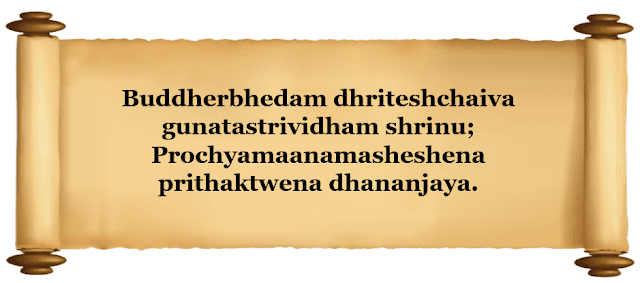Verse 29
Three qualities
of the intellect are mentioned here—three types of intellect, understanding.
“Hey
Arjuna, listen to the characteristics of understanding, the characteristics of
determination, which I shall now touch upon briefly.”
Sattvic understanding,
or intellection, is that which knows what is to be done and what is not to be
done under a given condition, what is proper and what is not proper. Place,
time and circumstance condition the undertaking of any work to determine which
work may be suitable at a particular moment and which work may not be suitable
at that moment.
That which may be fitting in this particular spot may not be suitable at another place, and that which is fitting under conditions prevailing now may not be fitting under conditions prevailing in a different manner altogether or in some other place.
That which may be fitting in this particular spot may not be suitable at another place, and that which is fitting under conditions prevailing now may not be fitting under conditions prevailing in a different manner altogether or in some other place.
The goodness and the badness of an
undertaking is not merely an ethical or a moral question. It is a philosophical
and metaphysical issue based finally on the very purpose of existence itself.
We have to decide for ourselves
what criteria we will hold in judging what is proper and improper. This is a
crucial question before us, and the judgment in this regard should be based,
finally, on the ultimate purpose of life. That is why one has to be very
intelligent in choosing any course of action.
Such a person is sattvic who
knows what is proper and what is improper, what is good and what is bad, what
is to be done and what is not to be done, what is a cause of bondage and what
is going to be liberating.
Only such a person can be really
intelligent, and that understanding can be regarded as sattvic in
its nature: sa buddhih partha sattviki.
Here Lord Krishna explains that
the buddhi or intellect of those who
have erroneous conceptions of theism and atheism and do not comprehend what is
righteousness and what is unrighteousness and what they entail and have no
understanding of what should be done and what should not be done according to
time, place and circumstance assuming wrongly what they think they know is
incorrect are situated in raja guna
the mode of passion.
The rājasic intellect becomes mixed due to personal
attachments. At times it sees clearly, but when self-interest comes into play,
it becomes tainted and confused.
The rājasic intellect, colored by attachments and
aversions, likes and dislikes is unable to discern the proper course of action.
It becomes confused between the important and the trivial, the permanent and
the transient, the valuable and the insignificant.
The worst kind of understanding
is tamasic buddhi, which totally misconstrues all things in a
topsy-turvy manner.
Totally wrong things are regarded
as very good things on account of a clouding of the intellect.
Every kind of objective in life is
viewed from a selfish point of view. There is no ability to link the
undertaking to the final purpose of life, because that consciousness of the
final purpose is completely obliterated from a tamasic buddhi.
The ‘determination’ that will be
taken up for discussion in the coming verses has a connection with
understanding. Intellect and will go together. The capacity of our deciding
factor—decision, determination, volition—depends much, or perhaps wholly, on
understanding.
To the extent of our understanding,
to that extent also we have the power of will. If the understanding is weak,
the will also is weak.




